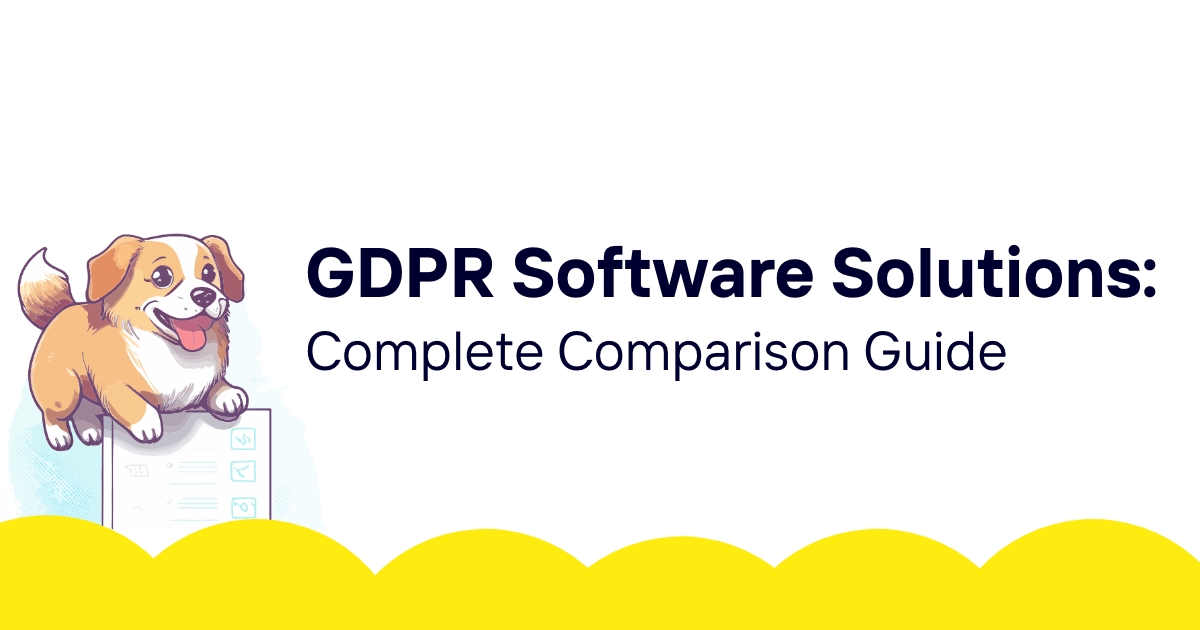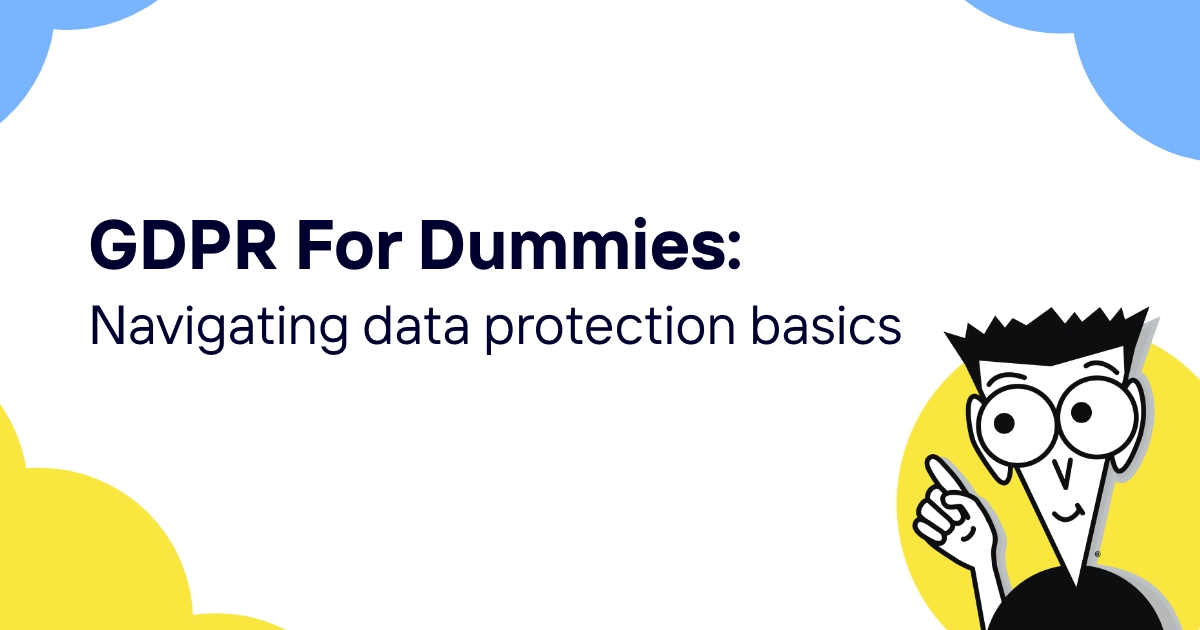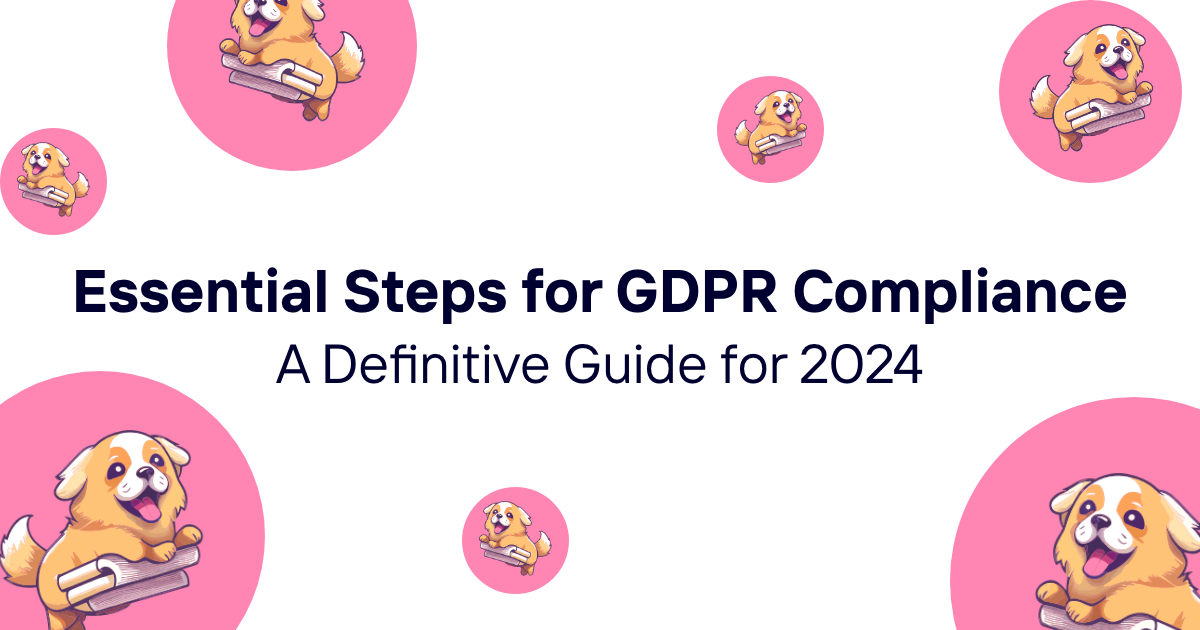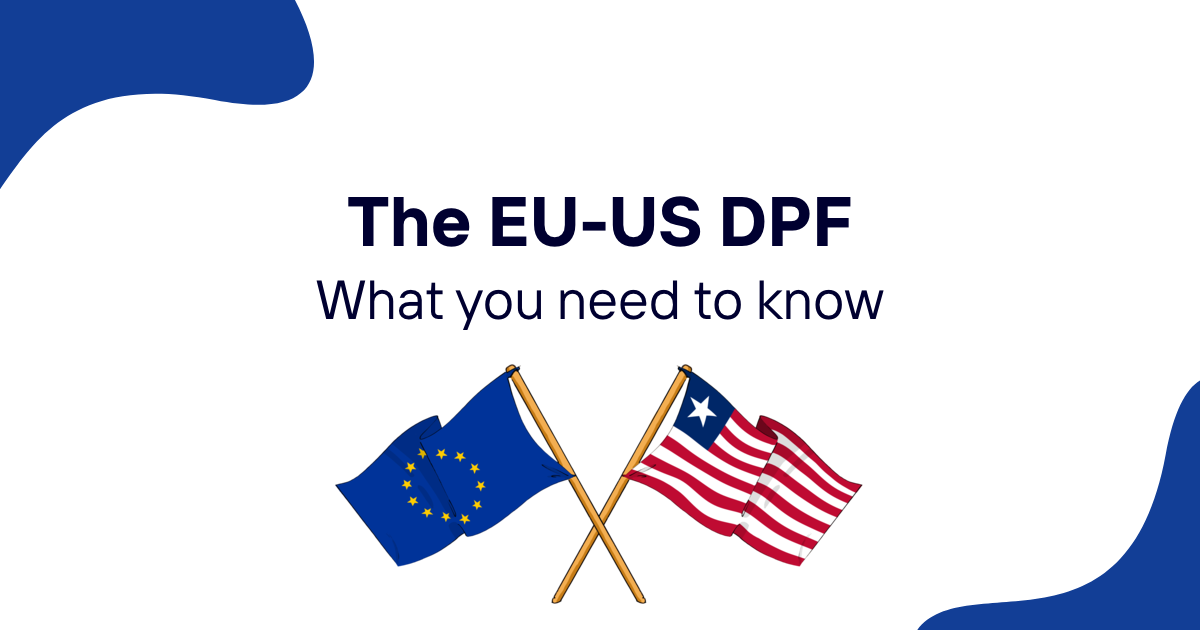Choosing the right GDPR software can make the difference between efficient compliance and costly manual processes that drain resources while creating compliance risks. With dozens of platforms claiming to solve privacy compliance challenges, understanding the real differences between solutions is essential for making informed decisions.
This comprehensive comparison guide analyzes leading GDPR software platforms across key criteria including features, pricing, implementation requirements, and business fit. Whether you're evaluating your first compliance solution or considering an upgrade, this guide provides the insights needed to choose the platform that best serves your specific needs.
Overview of GDPR Software Market
The GDPR software market has evolved significantly since the regulation's implementation, with platforms ranging from comprehensive enterprise solutions to specialized tools targeting specific compliance requirements.
Market Landscape and Trends
The privacy software market shows several clear trends that affect platform selection:
Consolidation Around Comprehensive Platforms: Organizations increasingly prefer integrated solutions that handle multiple compliance requirements rather than managing separate point solutions.
Automation Focus: Modern platforms emphasize automated data discovery, rights request processing, and compliance monitoring to reduce manual effort and human error.
Industry Specialization: Some vendors focus on specific industries like healthcare, financial services, or technology to provide more targeted compliance capabilities.
Integration Capabilities: Successful platforms offer extensive integration options to work with existing business systems and technology infrastructure.
Pricing Diversification: Vendors offer various pricing models from per-user subscriptions to data volume-based pricing to match different organizational needs and budgets.
Platform Categories and Positioning
GDPR software platforms generally fall into several distinct categories:
Enterprise Privacy Management: Comprehensive platforms designed for large organizations with complex compliance requirements and significant budgets.
Mid-Market Solutions: Balanced platforms offering substantial functionality at moderate price points suitable for growing businesses.
SMB-Focused Tools: Streamlined solutions designed for small and medium businesses with limited compliance resources and budget constraints.
Specialized Point Solutions: Focused tools addressing specific compliance areas like consent management, data discovery, or rights request processing.
Industry-Specific Platforms: Solutions designed for particular industries with specialized regulatory requirements and compliance frameworks.
Key Evaluation Criteria
Effective platform comparison requires systematic evaluation across multiple dimensions:
Feature Completeness: How well each platform addresses core GDPR requirements including data mapping, rights management, and breach response.
Ease of Implementation: The complexity and timeline required to deploy and configure each platform for production use.
Integration Capabilities: How well platforms connect with existing business systems, databases, and technology infrastructure.
Scalability: Each platform's ability to grow with business expansion and handle increasing data volumes and complexity.
Support Quality: The level and quality of customer support, training, and professional services available from each vendor.
Total Cost of Ownership: Comprehensive cost analysis including licensing, implementation, training, and ongoing operational expenses.
Vendor Stability and Viability
Platform selection requires considering long-term vendor viability and market position:
Financial Stability: Vendor financial health and funding sources that ensure long-term platform availability and development.
Market Position: Competitive positioning and market share that indicate platform staying power and continued investment.
Customer Base: Size and satisfaction of existing customer base as indicators of platform effectiveness and vendor reliability.
Product Development: Evidence of ongoing investment in platform capabilities and adaptation to changing regulatory requirements.
Regulatory Expertise: Vendor knowledge of privacy regulations and ability to adapt platforms to regulatory changes and enforcement trends.
Enterprise GDPR Platforms Analysis
Large organizations typically require comprehensive platforms with advanced capabilities, extensive customization options, and robust integration support.
OneTrust Privacy Management Platform
OneTrust dominates the enterprise privacy management market with comprehensive functionality:
Core Capabilities: Complete privacy program management including data mapping, assessment workflows, rights request processing, and vendor risk management.
Advanced Features: Sophisticated consent management, privacy impact assessment automation, and comprehensive reporting and analytics capabilities.
Integration Scope: Extensive integration options with enterprise systems including CRM platforms, databases, and business applications.
Customization Depth: Substantial customization capabilities for workflows, reporting, and user interfaces to match complex organizational requirements.
Pricing Considerations: Enterprise-focused pricing typically starts around $2,000+ per month with significant additional costs for professional services and advanced features.
Implementation Complexity: Comprehensive implementations often require 6-12 months with extensive professional services support.
TrustArc Privacy Platform
TrustArc offers enterprise privacy management with strong assessment and program management capabilities:
Assessment Focus: Comprehensive privacy assessments and risk evaluation tools designed for complex organizational environments.
Vendor Management: Advanced third-party risk assessment and vendor management capabilities for organizations with extensive supplier relationships.
Global Compliance: Strong support for multi-jurisdictional compliance with various international privacy frameworks beyond GDPR.
Consulting Integration: Tight integration between platform capabilities and professional consulting services for comprehensive privacy program development.
Enterprise Deployment: Designed for large organizations with complex compliance requirements and substantial implementation budgets.
Professional Services: Heavy emphasis on consulting and professional services as part of platform deployment and ongoing management.
Privitar Data Privacy Platform
Privitar focuses on data protection and privacy engineering for large-scale data processing environments:
Data Protection Emphasis: Advanced data anonymization, pseudonymization, and protection techniques for complex data environments.
Engineering Integration: Strong integration with data engineering workflows and enterprise data platforms.
Scalability Focus: Designed for organizations processing large volumes of personal data across complex technology environments.
Technical Sophistication: Advanced technical capabilities requiring significant expertise for implementation and management.
Use Case Specialization: Particularly strong for organizations with complex data analytics and machine learning use cases requiring privacy protection.
BigID Data Intelligence Platform
BigID provides data discovery and intelligence capabilities with privacy compliance features:
Data Discovery Excellence: Advanced automated data discovery and classification across complex enterprise environments.
Intelligence Capabilities: Sophisticated data analysis and intelligence features that go beyond basic compliance requirements.
Enterprise Scale: Designed for large organizations with massive data volumes and complex technology infrastructure.
Advanced Analytics: Strong analytics and reporting capabilities for understanding data usage patterns and compliance status.
Technical Requirements: Requires significant technical expertise and infrastructure for effective deployment and management.
SMB GDPR Software Solutions
Small and medium businesses need GDPR platforms that provide essential compliance capabilities without enterprise complexity or cost.
ComplyDog for B2B SaaS
ComplyDog specializes in GDPR compliance for B2B SaaS companies with focused, affordable solutions:
SaaS-Specific Design: Purpose-built for B2B SaaS companies with features that address specific software industry compliance challenges.
Rapid Implementation: Quick setup process that gets organizations compliant within hours rather than months of professional services.
Complete Compliance Portal: Out-of-the-box compliance portals that showcase data practices and handle data subject requests automatically.
Automated DPA Management: Streamlined data processing agreement creation and management for vendor relationships.
Transparent Pricing: Clear pricing starting at $49/month without hidden fees or complex pricing tiers.
Integration Focus: Pre-built integrations with popular SaaS tools and development frameworks commonly used by software companies.
As detailed in our what is EULA guide, software companies often need integrated approaches that address both licensing and privacy compliance requirements.
Osano Privacy Platform
Osano targets mid-market organizations with balanced functionality and pricing:
Consent Management Focus: Strong consent management capabilities with user-friendly implementation and management.
Mid-Market Positioning: Feature set and pricing designed for organizations that have outgrown basic tools but don't need enterprise complexity.
Implementation Simplicity: Streamlined implementation process that doesn't require extensive professional services.
Vendor Management: Solid vendor assessment and management capabilities for organizations with moderate supplier complexity.
Scalable Pricing: Pricing model that can grow with organizations without requiring major platform changes.
Usercentrics Consent Management
Usercentrics provides consent management with strong European market presence:
Consent Specialization: Deep expertise in consent management with sophisticated user interface and preference management capabilities.
European Compliance: Strong understanding of European privacy requirements and regulatory interpretation.
Website Integration: Streamlined integration with websites and digital properties for consent collection and management.
Reasonable Pricing: Moderate pricing suitable for mid-market organizations with substantial consent management needs.
Technical Implementation: Good technical documentation and support for consent management implementation.
DataGrail Privacy Operations
DataGrail focuses on automating privacy operations for growing organizations:
Automation Emphasis: Strong focus on automating repetitive privacy tasks to reduce manual effort and improve efficiency.
Rights Request Processing: Efficient automation of data subject rights requests with good integration capabilities.
Vendor Integrations: Solid integration capabilities with popular business applications and databases.
Scaling Organizations: Designed for organizations that are growing and need more sophisticated privacy management than basic tools provide.
Operational Focus: Emphasis on operational efficiency rather than comprehensive privacy program management.
Enzuzo Small Business Privacy
Enzuzo targets small businesses with simplified privacy compliance:
Small Business Focus: Designed specifically for small businesses with limited compliance resources and expertise.
Simplified Implementation: Very streamlined setup process with minimal technical requirements.
Basic Functionality: Essential privacy compliance features without complex advanced capabilities.
Affordable Pricing: Budget-friendly pricing suitable for small organizations with limited compliance budgets.
Educational Resources: Good educational content and support for organizations new to privacy compliance.
Specialized GDPR Tools and Features
Some organizations benefit from specialized tools that focus on specific aspects of GDPR compliance rather than comprehensive platform approaches.
Consent Management Specialists
Specialized consent management tools provide deep functionality for organizations with complex consent requirements:
Cookiebot CMP: Advanced cookie consent management with sophisticated scanning and categorization capabilities for complex websites.
Didomi Consent Platform: Enterprise-grade consent management with advanced preference centers and cross-device consent synchronization.
Quantcast Choice: Free and paid consent management options with good integration capabilities for digital advertising environments.
OneTrust Cookie Consent: Comprehensive cookie compliance tools integrated with broader privacy management capabilities.
Data Discovery and Classification Tools
Specialized data discovery platforms provide advanced capabilities for organizations with complex data environments:
Microsoft Purview: Comprehensive data governance and discovery capabilities integrated with Microsoft enterprise environments.
Varonis Data Classification: Advanced data discovery and classification with strong security and access control integration.
Spirion Data Discovery: Sophisticated data discovery capabilities with good integration with existing security and compliance tools.
Ground Labs Data Discovery: Enterprise-grade data discovery with advanced pattern recognition and classification capabilities.
Rights Request Management Systems
Dedicated rights request platforms provide advanced capabilities for organizations with high request volumes:
Subject Access Request Platforms: Specialized tools for managing high volumes of data subject access requests with advanced workflow capabilities.
Privacy Request Automation: Tools that integrate with existing business systems to automate rights request processing and response.
Identity Verification Systems: Specialized tools for verifying requester identity while maintaining security and user experience.
Response Generation Tools: Automated systems for compiling and formatting rights request responses that meet regulatory requirements.
Vendor Risk Assessment Tools
Specialized vendor risk management platforms provide advanced capabilities for organizations with complex supplier relationships:
Third-Party Risk Platforms: Comprehensive vendor risk assessment tools with privacy-specific evaluation capabilities.
Supplier Compliance Monitoring: Ongoing monitoring tools that track vendor compliance with privacy and security requirements.
Contract Management Integration: Tools that integrate vendor risk assessment with contract management and procurement processes.
Due Diligence Automation: Automated tools for conducting privacy and security due diligence on potential vendors and partners.
As outlined in our EULA full form guide, software companies often need specialized tools that address multiple types of legal and compliance requirements simultaneously.
Implementation and Integration Considerations
Successful GDPR software deployment requires careful attention to implementation complexity, integration requirements, and organizational change management.
Technical Integration Requirements
Different platforms have varying technical requirements that affect implementation success:
Database Connectivity: Platforms must integrate with existing databases and data storage systems to provide effective data discovery and management.
API Capabilities: Modern platforms require robust APIs for integrating with business applications, marketing tools, and other software systems.
Authentication Integration: GDPR platforms should integrate with existing authentication systems to provide seamless user experience and security.
Cloud Infrastructure: Platform deployment models affect integration complexity, with cloud-native solutions typically offering easier integration options.
Security Standards: Platforms must meet organizational security requirements including encryption, access controls, and audit logging.
Business System Integration
Effective GDPR compliance requires integration with core business systems and processes:
CRM Integration: Customer relationship management systems contain significant personal data requiring GDPR platform integration for effective compliance.
Marketing Automation: Marketing platforms process substantial personal data and require integration for consent management and rights request processing.
HR Systems: Employee data requires privacy protection, necessitating integration between GDPR platforms and human resources systems.
Financial Systems: Billing and payment processing systems may contain personal data requiring compliance integration.
Support Platforms: Customer support systems handle personal data and rights requests, requiring integration with GDPR compliance platforms.
Change Management and Training
Successful platform implementation requires comprehensive change management and user education:
Staff Training Programs: Comprehensive training for all staff who will interact with GDPR platforms or handle privacy-related responsibilities.
Process Documentation: Clear documentation of new compliance processes and procedures enabled by platform implementation.
Communication Strategies: Effective communication about privacy program changes and new compliance requirements throughout the organization.
Stakeholder Engagement: Involvement of key stakeholders from legal, IT, marketing, and business units in implementation planning and execution.
Performance Monitoring: Ongoing monitoring of platform adoption and effectiveness to identify areas needing additional support or training.
Implementation Timeline and Resource Planning
Realistic implementation planning considers platform complexity and organizational readiness:
Pre-Implementation Planning: Comprehensive planning including requirements gathering, vendor selection, and project team assembly typically requires 4-8 weeks.
Platform Configuration: Technical setup and configuration timelines vary significantly between platforms, from hours for simple solutions to months for enterprise platforms.
Data Integration: Connecting platforms to existing data sources and business systems often requires 2-8 weeks depending on complexity.
Testing and Validation: Comprehensive testing of platform functionality and integration typically requires 2-4 weeks before production deployment.
Training and Rollout: User training and phased rollout typically requires 2-6 weeks depending on organization size and platform complexity.
GDPR Software Pricing Models
Understanding different pricing approaches helps organizations budget appropriately and choose vendors with sustainable cost structures.
Per-User Subscription Models
Many platforms use per-user pricing that scales with organizational size:
Administrator Pricing: Some platforms charge based on the number of administrative users rather than total organizational users.
Full Organization Pricing: Other platforms charge for all users who might access the platform or be covered by compliance processes.
Tiered User Pricing: Platforms may offer different pricing tiers based on user roles and access levels within the organization.
Volume Discounts: Most vendors offer reduced per-user pricing for larger organizations with significant user counts.
Pricing Transparency: User-based pricing typically provides predictable costs that scale with organizational growth.
Data Volume-Based Pricing
Some platforms price based on the amount of personal data processed or managed:
Data Subject Pricing: Pricing based on the number of individuals whose data is processed through the platform.
Storage Volume Pricing: Some platforms charge based on the amount of data stored or processed through their systems.
Transaction Pricing: Platforms may charge based on the number of rights requests, assessments, or other transactions processed.
Processing Volume: Some vendors price based on the amount of data processing activity handled through their platforms.
Flat-Rate Enterprise Licensing
Enterprise platforms often use flat-rate pricing that provides predictable costs:
Annual Enterprise Licenses: Fixed annual fees that cover unlimited usage within agreed parameters.
Multi-Year Agreements: Longer-term contracts that provide cost predictability and often include volume discounts.
Professional Services Integration: Enterprise pricing often includes professional services for implementation, training, and ongoing support.
Custom Pricing: Large organizations often negotiate custom pricing based on specific requirements and usage patterns.
Feature-Based Tier Pricing
Many platforms offer multiple tiers with different feature sets and pricing:
Basic Tier Functionality: Entry-level tiers typically include essential compliance features at affordable price points.
Professional Tier Capabilities: Mid-tier options usually add advanced features like automation, integration, and enhanced reporting.
Enterprise Tier Comprehensiveness: Top-tier options provide comprehensive functionality including advanced customization and extensive integration options.
Add-On Module Pricing: Some platforms allow organizations to add specific capabilities to base packages for additional fees.
Total Cost of Ownership Analysis
Comprehensive cost evaluation must include all expenses associated with platform ownership:
Software Licensing: Annual or monthly subscription fees for platform access and basic functionality.
Implementation Services: Professional services for platform setup, configuration, and initial training.
Integration Development: Custom development work required to integrate platforms with existing business systems.
Training and Education: Ongoing training costs for staff education and certification programs.
Support and Maintenance: Annual support fees and costs for ongoing platform maintenance and updates.
Internal Resources: Staff time required for platform management, administration, and ongoing compliance activities.
Vendor Comparison Matrix
Systematic comparison across key criteria helps identify platforms that best match specific organizational needs and constraints.
Feature Completeness Comparison
Core GDPR compliance capabilities vary significantly between platforms:
Data Discovery and Mapping: Automated discovery capabilities range from basic database scanning to sophisticated AI-powered classification across complex environments.
Rights Request Processing: Platforms vary from manual workflow tools to fully automated systems that integrate with business applications.
Consent Management: Consent capabilities range from basic cookie banners to sophisticated preference centers with cross-device synchronization.
Assessment and Documentation: Privacy impact assessment tools vary from simple templates to comprehensive workflow management systems.
Vendor Management: Third-party risk assessment capabilities range from basic questionnaires to sophisticated ongoing monitoring systems.
Breach Management: Incident response tools vary from manual notification systems to automated breach detection and regulatory reporting.
Implementation and Support Comparison
Platform deployment requirements and support quality significantly affect success:
Implementation Complexity: Setup requirements range from simple configuration to complex multi-month professional services engagements.
Integration Capabilities: Pre-built integrations and API quality vary significantly between platforms and affect implementation timelines.
Documentation Quality: Platform documentation ranges from basic setup guides to comprehensive implementation and best practice resources.
Support Responsiveness: Customer support quality and response times vary significantly between vendors and pricing tiers.
Training Resources: Educational resources range from basic documentation to comprehensive certification programs and ongoing training.
Scalability and Growth Support
Platform ability to grow with organizations affects long-term viability:
Data Volume Scaling: Platforms vary in their ability to handle increasing amounts of personal data and processing complexity.
User Growth Support: Different pricing models and technical architectures support organizational growth differently.
Feature Expansion: Platform roadmaps and development priorities affect availability of new capabilities over time.
Geographic Expansion: International compliance support varies significantly between vendors and affects global business growth.
Integration Expansion: Platform ability to integrate with new business systems affects long-term flexibility and effectiveness.
Value Proposition Analysis
Different platforms provide value through different approaches and capabilities:
Cost Efficiency: Platform pricing and total cost of ownership vary significantly and affect return on investment calculations.
Time to Value: Implementation timelines and complexity affect how quickly organizations achieve compliance benefits.
Risk Reduction: Platform capabilities for reducing compliance risks and potential regulatory penalties vary significantly.
Operational Efficiency: Automation capabilities and workflow optimization affect ongoing operational benefits and resource requirements.
Competitive Advantage: Some platforms provide capabilities that enable competitive advantages through superior privacy practices and customer trust.
Choosing the Right GDPR Software
Selecting the optimal GDPR platform requires systematic evaluation of organizational needs, technical requirements, and long-term strategic objectives.
Organizational Needs Assessment
Start with comprehensive evaluation of your specific compliance requirements and constraints:
Industry Requirements: Different industries have varying regulatory requirements that affect platform selection and configuration needs.
Organizational Size: Company size affects platform complexity needs, budget constraints, and implementation resource availability.
Data Complexity: The complexity of your data environment affects platform requirements for discovery, integration, and management capabilities.
Geographic Scope: International operations create additional compliance requirements that platforms must support effectively.
Growth Trajectory: Business growth plans affect platform scalability requirements and long-term viability considerations.
Resource Constraints: Available budget, technical expertise, and implementation resources affect appropriate platform complexity and vendor support needs.
Technical Requirements Evaluation
Assess technical needs that will determine platform compatibility and implementation success:
Integration Requirements: Identify all business systems that must integrate with your GDPR platform for effective compliance management.
Security Standards: Determine security requirements including encryption, access controls, and audit logging that platforms must support.
Performance Needs: Assess performance requirements including data volume handling, response times, and concurrent user support needs.
Deployment Preferences: Evaluate preferences for cloud-based, on-premises, or hybrid deployment models based on security and operational requirements.
Customization Needs: Determine the level of customization required to match your specific business processes and compliance workflows.
Vendor Evaluation Process
Implement structured processes for evaluating potential vendors and platforms:
Requirement Documentation: Develop comprehensive requirements documents that clearly communicate your needs and enable consistent vendor evaluation.
Vendor Demonstrations: Require detailed product demonstrations that show how each platform addresses your specific use cases and requirements.
Reference Verification: Contact existing customers with similar business models and compliance requirements to validate vendor claims about capabilities and support.
Proof of Concept Testing: Conduct limited pilots or proof-of-concept projects to validate technical capabilities and user experience with real data and workflows.
Total Cost Analysis: Perform comprehensive cost analysis including all implementation, operational, and hidden costs over multiple years of platform ownership.
Decision Framework and Criteria
Use systematic approaches to make final platform selection decisions:
Weighted Scoring Matrix: Develop scoring systems that objectively evaluate vendors across all important criteria with appropriate weighting for your priorities.
Risk Assessment: Evaluate risks associated with each platform option including technical, financial, and operational risks that could affect success.
Implementation Planning: Consider implementation complexity and timeline requirements for each platform option and their alignment with business needs.
Long-Term Strategy: Assess how each platform aligns with long-term business strategy, growth plans, and evolving compliance requirements.
Stakeholder Consensus: Build consensus among key stakeholders including legal, IT, privacy, and business leadership before making final decisions.
Post-Selection Success Planning
Prepare for successful implementation and ongoing platform management after vendor selection:
Contract Negotiation: Negotiate favorable terms including pricing, service levels, implementation support, and ongoing maintenance commitments.
Implementation Project Planning: Develop detailed project plans with clear timelines, milestones, resource requirements, and success criteria.
Change Management Strategy: Plan comprehensive change management activities to ensure successful user adoption and process integration throughout the organization.
Success Metrics Definition: Define clear success criteria and measurement approaches for evaluating implementation success and ongoing platform value.
Long-Term Relationship Management: Establish procedures for managing ongoing vendor relationships, platform optimization, and adaptation to changing business needs.
Choosing the right GDPR software requires balancing comprehensive functionality with practical implementation considerations, budget constraints, and long-term strategic objectives. The most successful deployments result from careful planning, stakeholder involvement, and realistic assessment of organizational needs and capabilities.
For B2B SaaS companies specifically, platforms designed for software industry requirements often provide better value and faster implementation than generic enterprise solutions designed for large corporations with different compliance needs and resource constraints.
Ready to evaluate GDPR software solutions that are specifically designed for your business needs? Use ComplyDog and get comprehensive compliance capabilities designed for B2B SaaS companies, with rapid implementation, transparent pricing, and complete functionality starting at just $49/month.


















